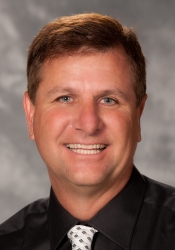 Dr. Mike Voight, professor of physical therapy at Belmont University, was featured today in the sports pages of the Tennessean (http://www.tennessean.com/article/20130312/SPORTS11/303120022/2072/SPORTS). Rich Hayes interviewed Voight and Lance Gill, the head athletic trainer at the Titleist Performance Institute in Oceanside, CA for his Midstate Golf Notebook which is featured regularly in the paper. He inquired about golf fitness. Voight also serves as a consultant with Titleist Performance Institute.
Dr. Mike Voight, professor of physical therapy at Belmont University, was featured today in the sports pages of the Tennessean (http://www.tennessean.com/article/20130312/SPORTS11/303120022/2072/SPORTS). Rich Hayes interviewed Voight and Lance Gill, the head athletic trainer at the Titleist Performance Institute in Oceanside, CA for his Midstate Golf Notebook which is featured regularly in the paper. He inquired about golf fitness. Voight also serves as a consultant with Titleist Performance Institute.
The printed article is included below:
from The Tennessean
by Rich Hayes
Midstate Golf Notebook
March 12, 2013Men, it’s time to roll out the yoga mat. Women, you all need to hit the weights.
That advice comes from two leaders in the field of golf fitness: Dr. Michael Voight, a professor of physical therapy at Belmont University; and Lance Gill, the head athletic trainer at the Titleist Performance Institute in Oceanside, Calif.
I met with both men recently at Dr. Voight’s golf laboratory at Belmont. (Yes, Belmont has a golf lab.) They urged recreational golfers to follow the example of touring pros and spend more time on their physical conditioning.
“At a country club, roughly 40 percent of membership can’t play golf at any given time because of injuries,” said Dr. Voight, who serves on the advisory board of the Titleist institute.
He and Gill have worked with some of the world’s best golfers, including Luke Donald, Rickie Fowler and Padraig Harrington. Last year, 32 out of 42 PGA Tour wins were associated with a Titleist fitness team.
“We personally both work with 10 to 15 guys directly on tour…their fitness level correlates directly with their success,” said Gill, who was in Nashville for evaluation of his own sports injury. He added that “fitness does not mean we’re in a gym pushing around weight and hurting ourselves and getting sore.”
I hoped to share a few of their go-to exercises today, but Gill said there is no “golden routine.”
“We make each person an ideal program for them. It’s targeted specifically to whatever impairment they have. Poor motor patterns are centered around physical limitations. If we get rid of the physical limitations, the motor pattern can be fixed.”
In his Belmont lab, Dr. Voight studies a golfer’s physical potential with high-tech monitoring devices. One involves sticking magnetic reflective balls on the body. Multiple videos cameras capture infrared signals, which are converted into a 3-D computer swing sequence.
A different gadget has radio transmitters that attach to the body. Another has electrotransmitters that can be strapped on to the upper and lower back and wrist.
He said his tools allow him to catch what teaching pros miss with traditional video cameras.
“What we do is like using an MRI…we go deeper to see everything that is going on,” Dr. Voight said. “We could tell you what your swing fault is without ever seeing a person pick up a club. It’s that telling.”
He and Gill aren’t suggesting that golf instructors are obsolete. Swing coaches need to be part of the assessment team, so they understand the physical limitations of their students and adapt swing fixes as necessary.
The goal is to maximize efficiency — basically, to get the most out of a golf swing given the body’s limitations.
The biggest hurdle for men is a lack of mobility. Men often have a limited rotation of the hips and thoracic (mid-to-upper) spine. Golfers often compensate with swing flaws that can cause lower-back pain, the most common injury in golf.
Thus, the general recommendation for guys is yoga.
Most women are already extremely flexible. They need to focus more on stability exercises, like lunges and squats, to keep their bodies from rotating too much.
Dr. Voight and Gill will be tough to hire if you’re interested in a one-on-one session. They travel around the world working with their pro clients and teaching others their methods. However, their assessment techniques are available at the Performance Golf Institute in Franklin.
“It’s a best kept secret,” said Dr. Voight.
Learn more at performancegolfinstitute.com.
